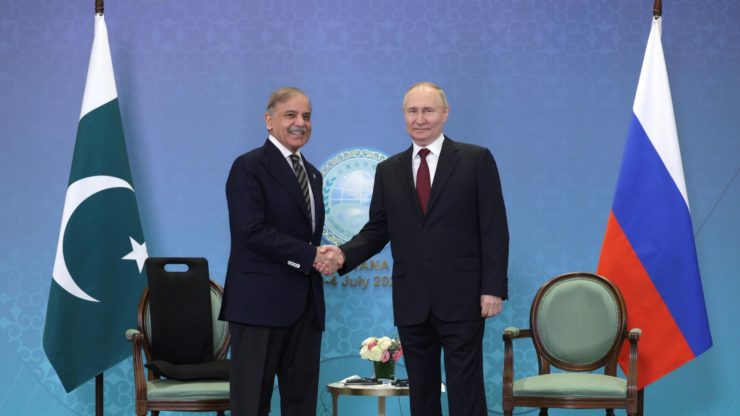
Relations between Pakistan and Russia have been improving for the previous few years. Historically, both countries have observed numerous fluctuations in their bilateral relations. The leaders of the two nations met at the 24th SCO Summit in Astana, Kazakhstan. Despite geopolitical impediments, both leaders demonstrated their desire to promote bilateral relations between the two sides.
A Glance at the History of Relations between Russia and Pakistan
Before the 1990s, relations between Pakistan and the then-Soviet Union saw numerous fluctuations. Pakistan’s Former President Muhammad Ayub Khan was the first-ever Pakistani head of state to visit Moscow. This visit proved highly successful and both the countries signed different agreements to promote trade, cultural exchanges, and economic cooperation. Russia mediated between Pakistan and India after the 1965 war, resulting in the signing of the Tashkent Declaration. In the early 1970s, the then-Pakistani Prime Minister Zulfiqar Ali Bhutto visited Moscow twice. This visit also proved lucrative for the improvement of relations between the two sides. The Soviet Union installed Pakistan’s first-ever steel mill in Karachi with a desire to improve bilateral relations. Unfortunately, the relations between the two sides saw a major shift in the 1980s. Pakistan sided with the US bloc against the Soviet Union in the Cold War. This US influence over Pakistan created a lot of misunderstandings between the two countries. However, the relations between Russia and Pakistan started improving at the turn of the 21st century. The then Pakistani President General Pervaiz Musharraf visited Russia in 2003. This was a major breakthrough in the bilateral relations of the two countries. Since then, there have been numerous visits of the officials from both sides. In 2022, Pakistan’s Former Prime Minister Imran Khan also visited Russia. He also alleges that he was ousted from power at the behest of the United States due to his desire to establish cordial relations with Russia.
Strengthening Pak-Russia Relations and the 24th SCO Summit
Pakistani Premier Shehbaz Sharif and Russian President Vladimir Putin met on the sidelines of the recent SCO Summit. The meeting proved highly lucrative for the future of the relations between the two countries. Both sides agreed to further cement the bilateral cooperation in different fields; military, economic, and political. Both sides agreed to utilize the SCO forum for furthering their political and strategic relationship. The two countries emphasized promoting and augmenting bilateral trade and commerce to strengthen their economic ties. Another significant aspect of the meeting was that the Barter trade was also discussed as an option for increasing bilateral trade and commerce between Pakistan and Russia. Currently, Pakistan’s economy is in shambles. Meanwhile, Russia is seeking to bolster its ties with the regional countries. Pak-Russia relations can help both sides to achieve their geostrategic and economic goals. Russia can help Pakistan to establish cordial relations with the Central Asian countries. Pakistan can establish economic relations with the Central Asian states with the help of Russia. The barter trade system discussed in the SCO Summit can also be expanded to other regional states after its success between Pakistan and Russia.
Both countries had excellent diplomatic relations since the 1990s. Islamabad and Moscow both seek to establish cordial bilateral relations. It is the right time for both sides to promote their bilateral relationship to a new zenith in all domains. Both countries have convergent views on different issues. Pakistan and Russia are highly concerned about the security situation in Afghanistan. Both countries seek to stabilize Afghanistan to avoid the looming humanitarian crisis. Extremist and Terrorist groups operating in Afghanistan often use poverty and inflation as a tool to lure youth into their trap. These terrorist groups also pose a grave threat to the stability of the Taliban government in Afghanistan. The interim Afghan government’s cooperation with the regional countries is the only solution for controlling the terrorist organization using the Afghan soil to conduct terrorism in the neighboring countries. For perpetual peace in the SCO region, cooperation between Pakistan, Russia, China, and Central Asian countries is mandatory.
Among the Muslim countries – especially in Pakistan, the policies of the Russian President Vladimir Putin are admired. Unlike the West, Putin holds a peculiar opinion about islamophobia and terrorism. His opinion contradicts the western propaganda against Muslims and Islam. On many occasions, he publicly criticized the blasphemous acts committed in the West. In 2021, President Putin stated, “Insulting the Prophet (PBUH) does not count as an expression of artistic freedom but is a violation of religious freedom.” He also criticized the publication of blasphemous sketches of the Holy Prophet (PBUH) in a French magazine. This created a positive and soft image of Russia in the whole Muslim world. Pakistani people admire him for his stance on these issues. Moreover, the popular opinion in Pakistan is strictly against the United States and the West and is in favor of Russia.
Future Prospects and Challenges
Both countries have unanimous views on different issues related to regional stability and peace. Cooperation between Russia and Pakistan is a need of the hour due to changing regional and global circumstances. The only impediment to the improvement of relations between the two sides is Pakistan’s economic dependence on the IMF and the West. It can only break the shackles of the IMF through cooperation with the emerging Eastern bloc. BRICS provides a great opportunity for Pakistan to decrease its dependence on the Bretton Woods Institutions and follow an independent foreign policy. CPEC also provides a unique opportunity for Pakistan to boost its economy and establish fraternal ties with Russia and other landlocked regional countries by providing them access to the Gwadar Port.
Abbas Hashemite – is a political observer and research analyst for regional and global geopolitical issues. He is currently working as an independent researcher and journalist, exclusively for “New Eastern Outlook”.
